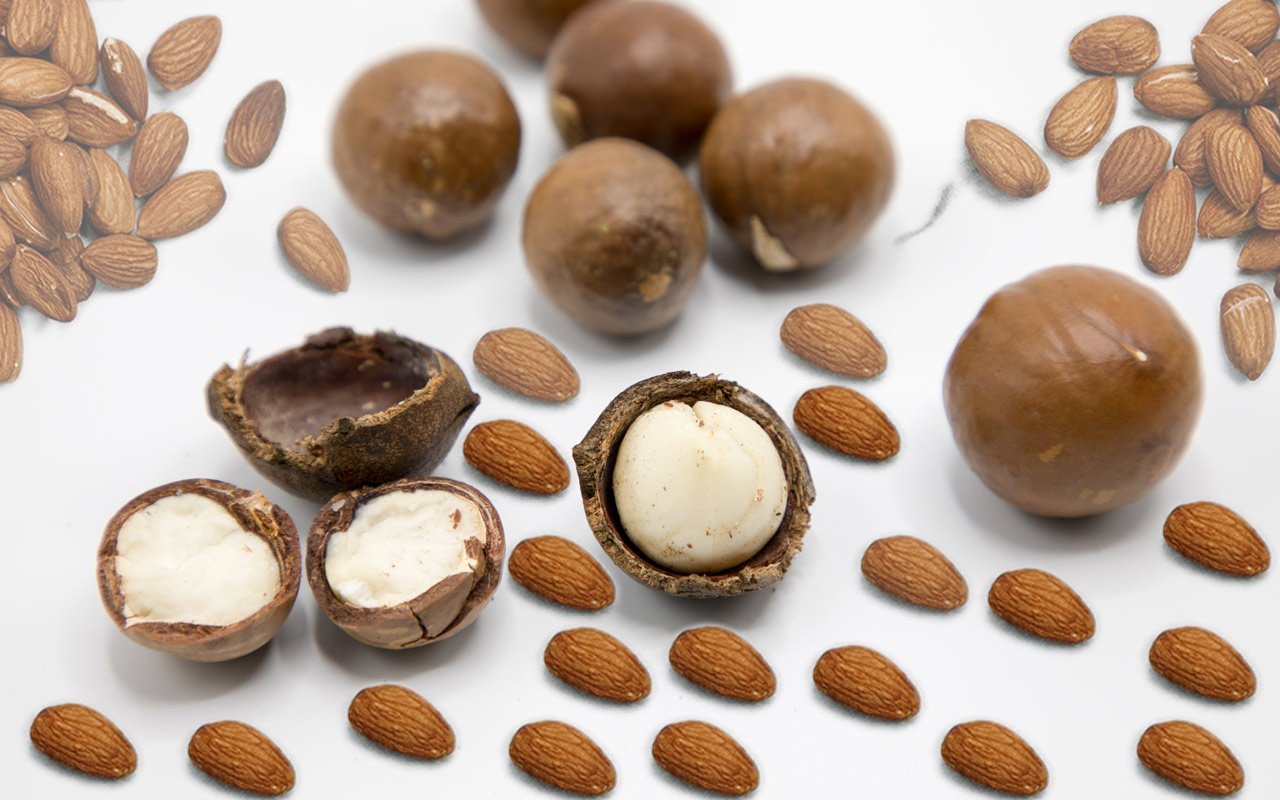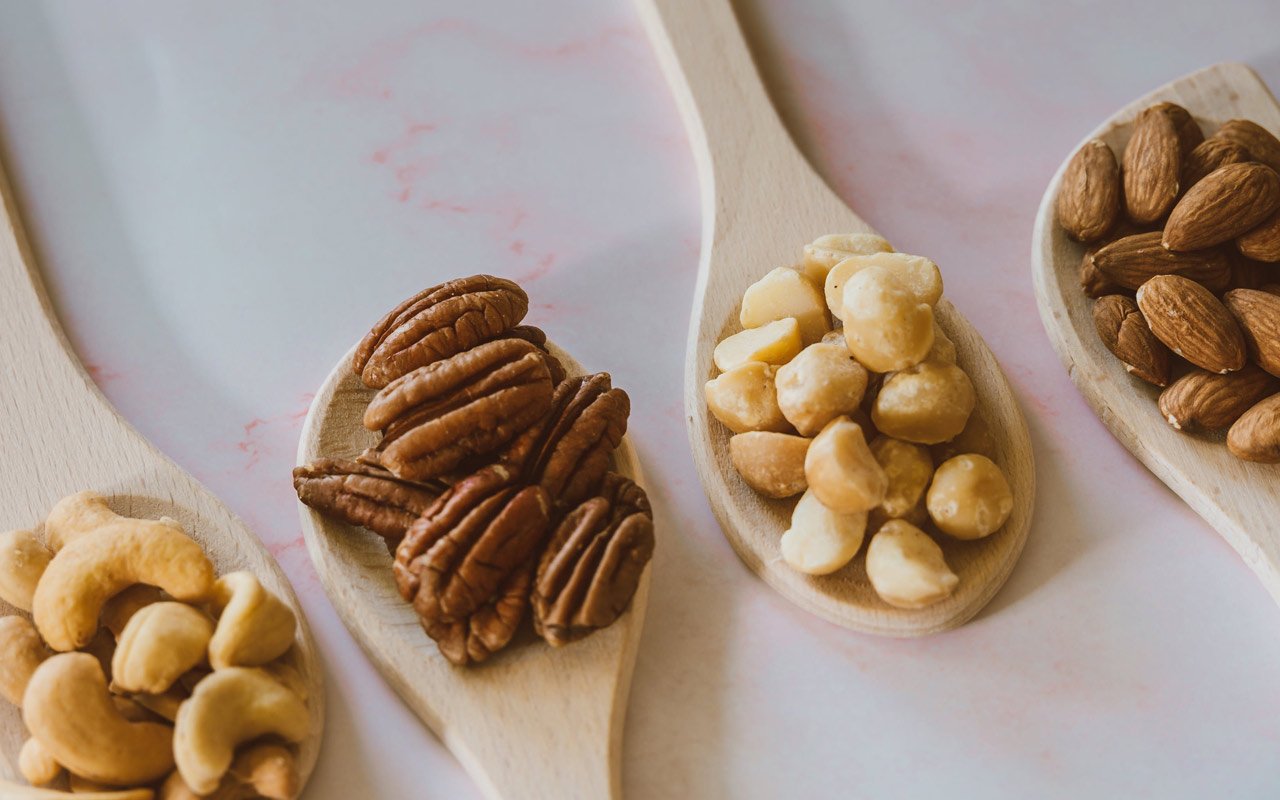Have you ever wondered if dogs can eat nuts? What nuts can dogs eat and which should not? This article will provide you with detailed information about nuts that dogs can eat as well as a list of nuts that can be dangerous for dogs if ingested.
Table of Contents
Can dogs eat nuts?
Yes, dogs can eat some nuts. However, only raw nuts should be given to dogs, not roasted with salt or seasoned with any other substances. Some nuts are often very high in fat and minerals, so they should only be given to dogs in moderation. In addition, there are some nuts that are very toxic to dogs, absolutely should not be given to dogs like macadamia nuts.
You can give your dog nuts on occasion, but there are certain nuts that dogs should not eat. Exercising too much nuts can cause obesity and dehydration.
Dogs should not eat too many nuts containing high fat. Because of their high-fat content, and the fact that some nuts can be cause choke on dogs, which are extremely dangerous. Some nuts are safe for dogs and can be eaten occasionally. If your dog eats too many nuts, it can cause long-term problems.
Pancreatitis can be caused by eating the wrong kind of nuts. A fatty diet can lead to pancreatitis in dogs, which is the inflammation of the pancreas. Pancreatitis can be characterized by vomiting, diarrhea, lethargy, and loss of appetite.
Although many nuts in our pantry are safe for dogs technically, there are some nuts that can be toxic to dogs. Also, any nuts that have become moldy are toxic.
Although small amounts of nuts and nut butter can be safe for dogs, it is important that you are aware of any potential toxicities and risk factors. Despite being small in size, nuts can be high in calories and fat. Even if you only offer a small amount, it can make a big difference in how much dogs eat.
Many dogs are better off avoiding nuts, choosing a safer option that has fewer calories, fat, salt and is less toxic.
While nuts can have many health benefits when they are included in a healthy diet for humans, it is not known how nuts will affect the long-term health of dogs. It is believed that nuts are too fattening and calorie-dense for dogs and should not be part of their daily diet.
Most animal experts agree that dogs can eat nuts from time to time. You only need to know what nuts your dog is allowed to eat.
Sounds confusing, right? So what nuts can dogs eat? It’s okay, read on. Below is a list that includes nuts that dogs can eat. This list is not applicable to all dogs. You should always consult your veterinarian before giving any nuts to your dog. It is sometimes safe for dogs but can cause serious health problems in some cases.
What nuts can dogs eat?
Just like any other human foods that dogs can eat, you should limit your dog’s intake of nuts. A suitable and balanced diet between nuts and other foods for your dog will be wonderful. Do not give your dog any kind of food for a long time, or too much at one time.
If you are still wondering what nuts are safe for dogs then, fortunately, below is a list of very safe nuts dogs can eat that may interest you.
Cashews
According to the Ollie dog food brand, cashews can be eaten in small amounts by dogs. Only unseasoned and unsalted cashews!
If roasted, cashews can be safe for dogs. They are usually sold roasted because they come from the same botanical family-like sumac or poison ivy. Do not give your dog raw cashews or their shells. Ingestion can cause toxic reactions.
Cashews nuts are high in calories and fat. Cashews are high in fat and calories. You should only eat them sparingly. Too many can cause pancreatitis and stomach ache. High levels of potassium can cause problems in the urinary tract for dogs that are susceptible.
Large cashew nuts can pose a danger to dogs’ health, even for larger breeds. This is particularly true for small breeds. You also have to be aware of the possibility of intestinal obstruction.
Chestnuts
According to the ASPCA, chestnuts are safe for dogs. However, they may not be the best choice for dogs who eat quickly or who tend to swallow whole foods. Chestnuts can get stuck in the dog’s throat.
Peanuts
Dogs can eat plain peanuts. Peanuts, like legumes such as peas or lentils, are safe for dogs to eat. If you plan to give peanuts to your dog, make sure they are fully shelled. Peanut butter that you give to your dog should not contain xylitol. This artificial sweetener is extremely toxic and can cause serious health problems.
Pecans
Pecans are safe for dogs. Pecans are not toxic and will be safe for your dog. They are high in fat so be gentle.
Pistachios
Dogs can be offered pistachios in small amounts. The shells should not be allowed to be eaten by your dog. The pistachio shells pose an additional choking risk and could cause injury to your dog’s throat or mouth.
Nuts dogs can’t eat

Almonds
Almonds seem to be the most controversial. PetMD claims they are safe to eat occasionally. However, the American Kennel Club states that almonds should not be used as a treat for dogs. It is best to avoid almonds. It’s okay for your dog to grab an almond from the ground, but it is not the end. Watch him carefully to ensure he doesn’t choke.
Brazil nuts
Brazil nuts are high in fat and should not be fed to dogs. While eating one might not be harmful to your large dog’s health, giving more could lead to an upset stomach and even pancreatitis.
Even one brazil nut can be dangerous for a small dog. Brazil nuts pose a greater threat to smaller breeds, as they can get stuck in their digestive systems.
Small breed dogs are at the greatest risk of choking and intestinal blockage from these nuts.
Hazelnuts
Hazelnuts can be dangerously choking, just like almonds. Although you don’t have to call your vet immediately if your dog eats a hazelnut from your hand, it is a good idea to not feed them regularly.
Macadamia nuts
Although macadamia nuts have numerous nutritional benefits to humans, they are extremely toxic to dogs and can be fatal in dogs if ingested.
They can cause weakness, paralysis, tremors, joint inflammation, and tremors. Your vet should be contacted if your dog swallows macadamia nuts or nibbles them.
Walnuts
Dogs can be seriously injured by walnuts because of their unusual shape. These nuts can cause serious choking and block the digestive system.
English and Black walnuts are the most popular. They are not safe to be fed to dogs. These nuts can cause blockage and choking problems, as well as other issues.
Walnuts, especially Black Walnuts, can contain juglone. This poisonous substance is secreted from the roots of walnut trees. It’s designed to prevent other plants from growing around it and to stick to the walnut shell when they fall from the tree. Juglone can cause laminitis in horses, and convulsions in dogs.
Mycotoxins can also be found in walnuts. This is a toxic substance that molds and fungi produce. It can cause seizures or convulsions. Make sure your dog is not exposed to any fallen walnuts if you have a walnut tree.
English walnuts, which are most commonly used for cooking, are safest and least toxic for dogs. They are less toxic than the Black Walnut because they contain less juglone. They are high in calories and fat, so they should be eaten sparingly and not whole.
Pistachios
Although these green nuts are loved by humans, they can cause serious health problems for canines. Pistachios can be contaminated with Aspergillus mold, which can cause aflatoxin to your dog’s liver. Pistachios can cause intestinal obstruction in dogs, especially if they are not shelled.
Pancreatitis can also be caused by the high-fat content of pistachios. It is important to monitor your dog for signs of gastrointestinal distress if he eats pistachios. Pistachios can also cause weight gain for dogs because they are high in calories.
Pecans
Pecan pie may be the perfect treat for a rainy day. However, your dog should avoid these delicious nuts. Moldy pecans can contain aflatoxin, which is produced by Aspergillus mushrooms. This substance can cause liver damage in dogs. Dog inflammation can also be caused by high levels of omega-6 fatty acid in pecans.
Hickory Nuts
For the same reasons that walnuts and pecans, nuts like these are not safe for dogs. They may contain mycotoxins, molds, which can cause seizures and convulsions.
Pine Nuts
These nuts are safe for your dog. They are high in fats and phosphorus so be careful. Too many can lead to gastrointestinal upsets and even pancreatitis.
High levels of phosphorus can cause problems in dogs with urinary tract issues. We recommend that pine nuts are not eaten by dogs.
Signs that a dog may have nut poisoning
Sometimes, nut poisoning is not immediately obvious. It is important to quickly diagnose nut poisoning by closely monitoring your dog’s behavior. Dog owners who catch a health problem quickly can help their dogs receive treatment.
What are the signs and symptoms of nut poisoning for dogs?
Some symptoms may include:
- Vomiting
- Diarrhea
- Tremors
- Fever
- Weakness
- Inability to use the hind legs
- Depression (in certain cases)
Experts recommend that dog owners seek immediate treatment if their dogs exhibit any of these symptoms.
Summary
Nuts are not the best food for your four-legged friend. Although nuts are not necessarily dangerous to dogs, excessive consumption can cause obesity in canines and other serious health problems such as pancreatitis. You can pamper your dog with treats that are lower in calories and fats than nuts.
Nuts are high in fat, and can also contain sodium and phosphorus. You should avoid making nuts a regular part of your dog’s daily diet. You can coat nuts with pepper, onions, garlic, cocoa, sugar, or too much salt. Salt is known to worsen or relapse existing health problems in dogs with heart and kidney disease, as well as causing high blood pressure and urinary stones.
There is also a risk of fungal contamination that could put your dog’s health at risk. If your dog steals a few nuts from your stash, you should monitor them. To avoid potential health problems, make sure your veterinarian is notified if your dog ate nuts that aren’t on the list.

